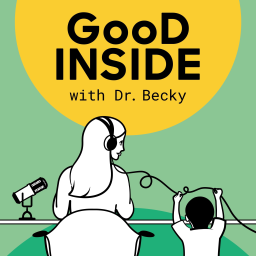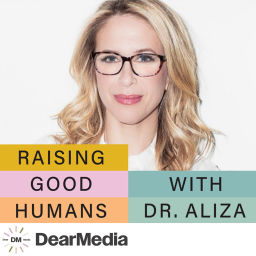
by The Free Press
Poseidon is the god of the sea, Dionysus of wine and merrymaking, and Emily Oster? She’s the god of parenting. An economics professor at Brown University, Oster has built a massive and loyal audience by providing overwhelmed parents with the information and data they need to make solid and sound parenting decisions in a very confusing world. Her first book, Expecting Better: Why the Conventional Pregnancy Wisdom Is Wrong—and What You Really Need to Know, sold over a million copies and was translated into 19 languages, unseating the classic What to Expect When You’re Expecting as a fixture on many pregnant mothers’ bedtime tables. In this new series with The Free Press, Oster tackles the deep, difficult, existential, and often controversial questions facing parents today: Are we too soft on kids these days? How do I raise an independent child in an era of overprotection and helicopter parenting? Why are so many teen girls unhappy and anxious, and how can we make them happy again? Why are boys being left behind? Are kids overdiagnosed? What to do about the phones!? Is marriage important for raising kids? Should you even have kids at all? These questions are more urgent than ever. That’s because, by many measures, kids are worse off today than 30 years ago. They are more anxious than ever. They’re more depressed. They have more diagnoses than ever before. They’re more medicated. More kids are being raised without two parents in the home today. Kids’ reading and math scores haven’t recovered since their decline during the Covid pandemic. Childhood obesity has risen to 19.7 percent. Kids spend on average 7.5 hours in front of a screen for entertainment each day, and the average teen spends around 9 hours a day on their phone. What’s going on with kids today? How worried should we be about our kids? And what should we be doing, as parents, to change course, before it’s too late? How do we raise good people—which starts with raising good, informed parents—in this strange, new world? Over eight episodes, Oster speaks with over 50 of the world’s best parenting experts, journalists, doctors, psychologists, researchers, and more including: Dr. Becky, Jonathan Haidt, Pamela Druckerman, Richard Reeves, Hanna Rosin, Abigail Shrier, Bryan Caplan, Christine Emba, Johann Hari, Sami Timimi, Melissa Kearney, Ross Douthat, and many, many more. Oster brings her trusted voice—with its sobriety, wisdom, and humor—to the most challenging parenting questions of the day. The best way to support this podcast is to become a Free Press subscriber today at TheFP.com/subscribe
Language
🇺🇲
Publishing Since
9/6/2024
Email Addresses
1 available
Phone Numbers
0 available

April 9, 2025
We have a special bonus episode for the Raising Parents feed. It’s an episode of “My So-Called Midlife” by Reshma Saujani and Lemonada Media. Reshma Saujani is the founder of Girls Who Code. She’s written several books, including Girls Who Code, Pay Up, and Brave, Not Perfect. And now she is sharing her insights from midlife on mic. Reshma Saujani sits down with Emily Oster to discuss midlife, from scheduling sex to career pivots to parenting struggles to pregnancy and parenting myths. We want to play that episode for you today. You can check out “My So-Called Midlife.”

November 13, 2024
For most of human history, having kids wasn’t much of a choice. Social expectations, lack of birth control, and limited autonomy for women presented a couple of options: Have children, or join a convent. But the 1960s ushered in a big change. With better options for birth control and expanded career opportunities for women, many people for the first time could choose how many children to have, and whether they should have any at all. Fast-forward to today: More people are choosing not to have children for a wide range of reasons. Having children, of course, is a personal choice. But it’s a choice that has broader implications. Everywhere across the globe—the U.S., Europe, Asia, Africa—fewer children are being born. And strangely enough, having kids has become part of the culture wars. There are pro-natalist public figures like Elon Musk on one side saying everyone needs to have more kids now in order to save humanity. And on the other side, people like climate activist Greta Thunberg say rising sea levels are so catastrophic that having kids in this era is akin to genocide. But there’s no debate that the fertility rate is plummeting in America and around the world. Presently, American women, on average, have 1.8 kids. In the 1950s, it was 3. The replacement rate in the United States, which is the fertility rate needed for a generation to replace itself without considering immigration, is approximately 2.1 births per woman. Around the world, the fertility rate fell by more than half between 1950 and 2021, as many countries became wealthier and women chose to have fewer children. For economists like Emily, the speed with which the fertility rate is falling is cause for alarm. Economic growth depends, at least in part, on population growth. Retired people rely on generations of younger workers for support, through contributions to Social Security and taxes. With fertility rates in free fall, the math doesn’t add up. That’s the big picture. Now back to our own families. Our series so far has focused on the state of our children. Today, we cap things off with a fundamental question: Should we even have kids in the first place, and what happens if we don’t? *** Resources from this episode: Bryan Caplan: Selfish Reasons To Have More Kids (Bookshop) Gina Rushton The Parenthood Dilemma: Procreation in the Age of Uncertainty (Bookshop) Leah Libresco Sargeant Helena de Groot Ross Douthat

October 30, 2024
The share of children in America growing up in single-parent families has tripled since 1950—from 10 percent to 30 percent. Children in single-parent families are three times as likely to live below the poverty level and, on average, they have a higher likelihood of poor academic performance and higher dropout rates from high school. Those translate into lower earnings in adulthood. And although it is very difficult to separate correlation and causality in these data, and hard to say whether single parenthood matters beyond poverty, there is no question that the associations are very strong. Today: What happened to marriage in America? How has the trend divided along class lines and contributed to the widening economic gap? Is having two parents actually better for kids than a single parent? What advantages does growing up in a married family actually confer upon kids? In the research world, these questions aren’t partisan. They’re questions that can be answered with data. Resources from this episode: Books/links: Melissa S. Kearney The Two-Parent Privilege: How Americans Stopped Getting Married and Started Falling Behind (Bookshop) Melissa S. Kearney on Honestly Philip N. Cohen’s critique of Melissa Kearney’s The Two-Parent Privilege Abby M. McCloskey

The Free Press

ParentData

The New York Times

Rockwell

Dr. Becky Kennedy

Dear Media, Aliza Pressman

The Progress Network with Zachary Karabell and Emma Varvaloucas

Kmele Foster, Michael Moynihan, and Matt Welch

This Is 42

Ark Media

New York Times Opinion

Katie Herzog and Jesse Singal

Glenn Loury

Crooked Media

NPR
Pod Engine is not affiliated with, endorsed by, or officially connected with any of the podcasts displayed on this platform. We operate independently as a podcast discovery and analytics service.
All podcast artwork, thumbnails, and content displayed on this page are the property of their respective owners and are protected by applicable copyright laws. This includes, but is not limited to, podcast cover art, episode artwork, show descriptions, episode titles, transcripts, audio snippets, and any other content originating from the podcast creators or their licensors.
We display this content under fair use principles and/or implied license for the purpose of podcast discovery, information, and commentary. We make no claim of ownership over any podcast content, artwork, or related materials shown on this platform. All trademarks, service marks, and trade names are the property of their respective owners.
While we strive to ensure all content usage is properly authorized, if you are a rights holder and believe your content is being used inappropriately or without proper authorization, please contact us immediately at [email protected] for prompt review and appropriate action, which may include content removal or proper attribution.
By accessing and using this platform, you acknowledge and agree to respect all applicable copyright laws and intellectual property rights of content owners. Any unauthorized reproduction, distribution, or commercial use of the content displayed on this platform is strictly prohibited.